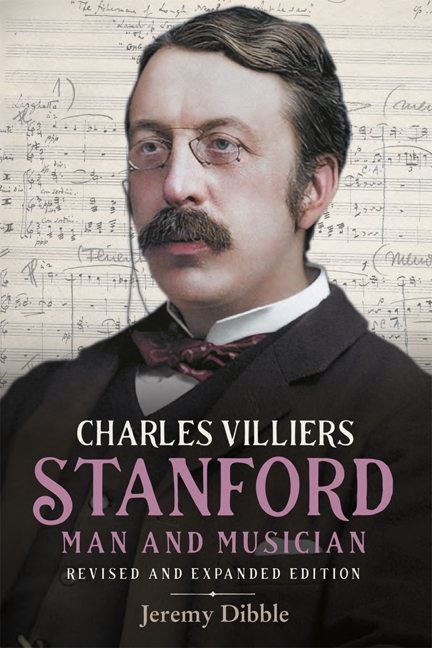Book contents
- Frontmatter
- Dedication
- Contents
- List of Illustrations
- List of Music Examples
- List of Analytical Tables
- Preface and Acknowledgements
- Supplementary Introduction to the Revised and Expanded Edition
- List of Sigla and Abbreviations
- I Early Influences and Impressions, 1852–70
- II Formative Years, 1870–87
- III Recognition, 1888–1901
- IV The New Generation, 1901–14
- V War and Decline, 1914–24
- Appendix: List of Works
- Select Bibliography
- Index of Works
- General Index
- Irish Musical Studies Previous volumes
4 - A Promising Future: The Cambridge University Musical Society, Opera and a Revolution in Church Music (1877–82)
Published online by Cambridge University Press: 12 May 2024
- Frontmatter
- Dedication
- Contents
- List of Illustrations
- List of Music Examples
- List of Analytical Tables
- Preface and Acknowledgements
- Supplementary Introduction to the Revised and Expanded Edition
- List of Sigla and Abbreviations
- I Early Influences and Impressions, 1852–70
- II Formative Years, 1870–87
- III Recognition, 1888–1901
- IV The New Generation, 1901–14
- V War and Decline, 1914–24
- Appendix: List of Works
- Select Bibliography
- Index of Works
- General Index
- Irish Musical Studies Previous volumes
Summary
Ill-health cut short Stanford's final stay in Berlin. ‘I am happily nearly all right again now,’ he wrote to Joachim, ‘and looking forward with tremendous excitement to the 8th.’ The Lent Term of 1877 was, as usual, a busy one. Stanford returned to take up his more permanent duties with the chapel choir at Trinity, though it was not until Lady Day (25 March) that he was officially confirmed in his position as Chapel Organist. Conditions for the post included a stipend of £250 together with rooms and Commons, though it was still for the Choir Committee to draw up a new set of conditions. Though these proved to have some advantages, notably sanction to be continuously absent from college during all weeks in the year when there was no choral service, they were also a source of irritation, particularly since the Precentor still retained the responsibility for the selection of music.
The ‘Wednesday Pops’ proceeded with increased vigour. Of the six scheduled concerts in February and March, Stanford appeared in the first four as pianist with members of the ‘Stanford Quartet’, as a duettist with Fuller Maitland in Schumann's Bilder aus Osten Op. 66 (21 February) and in his own ‘Andante and Scherzo from a Serenade’ (7 March) which were most probably two movements of his later Serenade Op. 18 for orchestra. February also saw the completion of Three Ditties of the Olden Time which consisted of two settings of Sir John Suckling's well-known lyrics (‘Out upon it’ and ‘Why so pale and wan’) and one by Herrick (‘To carnations’); they were published by Stanley Lucas.
The high point of the term for CUMS was of course the choral and orchestral concert of 8 March given at the Guildhall in aid of Addenbrooke's Hospital. After a morning rehearsal of the fifty-piece, London-based orchestra (an expenditure for the Society of £217/-/10d) and chorus of 150, Joachim received his degree in the afternoon. The concert in the evening proved to be a major social occasion attracting the likes of Lord Leighton, Robert Browning, George Lewes, Edward Dannreuther, August Manns, Manuel Garcia, Ebenezer Prout and the usual fraternity of critics: Bennett, Grüneisen, Hueffer and Davison. A concert in Manchester prevented Hallé from attending, and the up-and-coming Parry was in Cannes, detained by the necessity of his wife's convalescence.
- Type
- Chapter
- Information
- Charles Villiers StanfordMan and Musician, pp. 97 - 150Publisher: Boydell & BrewerPrint publication year: 2024

